Adult Deworming Guide
Our adult horse guide includes recommendations for broodmares along with low and high shedders.
View Document
In any herd, between 20% and 30% of horses will be high shedders,* meaning they contribute more to reinfesting all horses on the property. Ask your veterinarian to run fecal egg count (FEC) tests on all horses at least once per year to identify the high shedders in your herd and deworm them accordingly.1 Your veterinarian may also suggest a fecal egg count reduction test 14 days after the fecal egg count to determine if there is dewormer resistance.
Learn more about FEC tests
*500+ eggs per gram (EPG) in FEC test.
A fecal egg count (FEC) test is performed by your veterinarian to establish the current level of parasite shedding in your horse’s feces.
An FEC test is recommended during spring and fall wellness exams for adult horses.
Schedule an FEC test for broodmares in the first trimester.
An FEC test should be included as part of a yearling's annual spring wellness exam.
Foals should have their first FEC test at 5 to 6 months of age.
Zoetis Equine offers the most comprehensive portfolio of deworming solutions, specifically tailored to address the most dangerous parasites for each life stage. Targeting these parasites with appropriate anthelmintic classes is essential to modern-day parasite control.
Foals
(2+ months old)
Yearlings
Depending on results
of fecal egg count
(FEC)
Foals
(6+ months old)
Yearlings
Broodmares
Adult horses
Foals
(6 months old)
Yearlings
Broodmares
Adult horses
The Zoetis product quiz will help you determine the effective product to use at the most appropriate time of year to help maintain your horse's health.
Utilize these deworming guides for adult horses, foals, and yearlings to adhere to the recommended
deworming schedule for each stage of your horse's life.
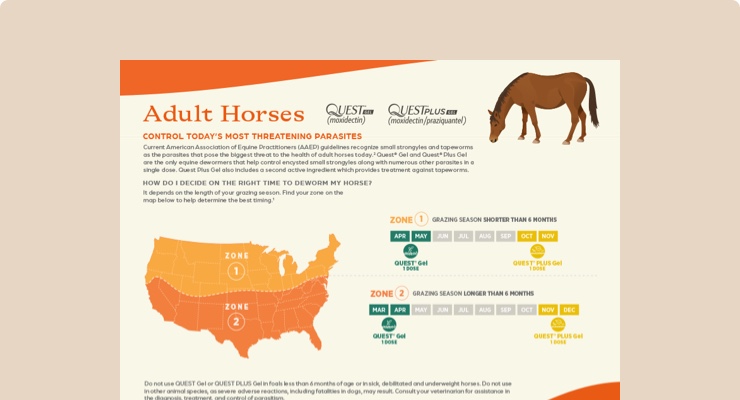
Our adult horse guide includes recommendations for broodmares along with low and high shedders.
View Document
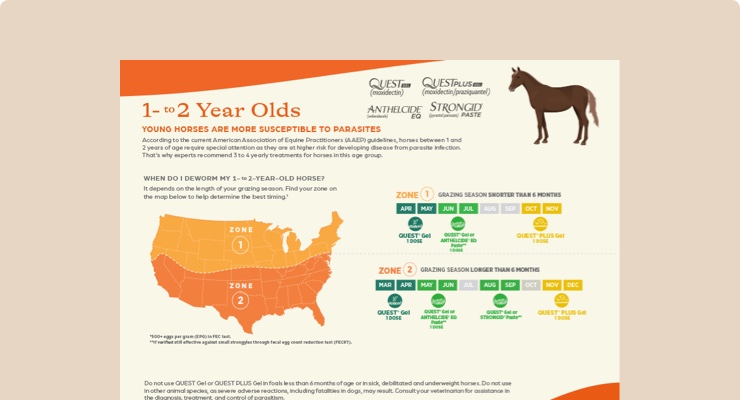
Young horses are more susceptible to parasites. See our comprehensive guide to deworming 1- to 2-year-old horses.
View Document
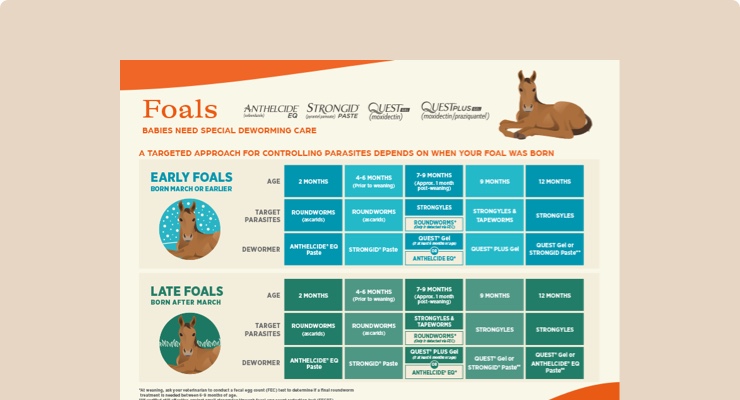
Foals require special care in their first year of life. View our customized deworming schedule to help plan for timely treatments.
View Document
Overuse of dewormers over many years, although well-intentioned, has led to parasites developing resistance to certain ingredients. It is critical to use an effective product at the appropriate time of year. By doing so, we can help control parasites while helping reduce the selection for resistance.1
Download the product comparison chart
| Product Name | Quest® Gel | Quest® Plus Gel | Anthelcide® EQ Paste | Strongid® Paste | Zimecterin®, IverCare®, Eqvalan®, Duramectin®, Bimectin® | Zimecterin Gold®, EquiMAX® | Safe-Guard®, Panacur® | Panacur® POWERPAC |
||
|---|---|---|---|---|---|---|---|---|---|---|
| Active ingredients | Moxidectin | Moxidectin & Praziquantel | Oxibendazole | Pyrantel Pamoate | Ivermectin | Ivermectin & Praziquantel | Fenbendazole | 5-Day Double-Dose Fenbendazole | ||
| Parasites | Most threatening to horses | Tapeworms |
|
|
||||||
| Adult Small Strongyles |
|
|
|
|
**
|
**
| ||||
| Encysted Small Strongyle Larvae |
|
|
**
| |||||||
| Adult Large Strongyles |
|
|
|
|
|
|
|
| ||
| Migrating Large Strongyle Larvae |
|
|
|
|
| |||||
| Added coverage | Roundworms Most threatening to foals and young horses† |
*
|
*
|
|
|
*
|
*
|
|
| |
| Bots |
|
|
|
|
||||||
| Pinworms |
|
|
|
|
|
|
|
| ||
| Hairworms |
|
|
|
|
||||||
| Stomach Worms |
|
|
|
|
||||||
Do not use Quest Gel or Quest Plus Gel in foals less than 6 months of age or in sick, debilitated and underweight horses. Do not use in other animal species, as severe adverse reactions, including fatalities in dogs, may result. Consult your veterinarian for assistance in the diagnosis, treatment, and control of parasitism.
*Per the 2024 American Association of Equine Practitioners’ Internal Parasite Control Guidelines there is widespread roundworm (ascarid) resistance (lack of efficacy) to the macrocyclic lactones (moxidectin and ivermectin). If macrocyclic lactone resistance is suspected based on lack of clinical response, the 2024 American Association of Equine Practitioners Internal Parasites Guidelines recommends benzimidazoles (oxibendazole and fenbendazole) should be given.
**If demonstrated still effective by fecal egg count reduction testing. Per the 2024 American Association of Equine Practitioners’ Internal Parasite Control Guidelines there is widespread small strongyle resistance (lack of efficacy) to the benzimidazoles and pyrimidines.
†American Association of Equine Practitioners. Internal parasite control guidelines. https://aaep.org/resource/internal-parasite-control-guidelines. Accessed June 24, 2024.
We provide the most comprehensive range of equine dewormers to treat the most dangerous parasites for each life stage without over-deworming.
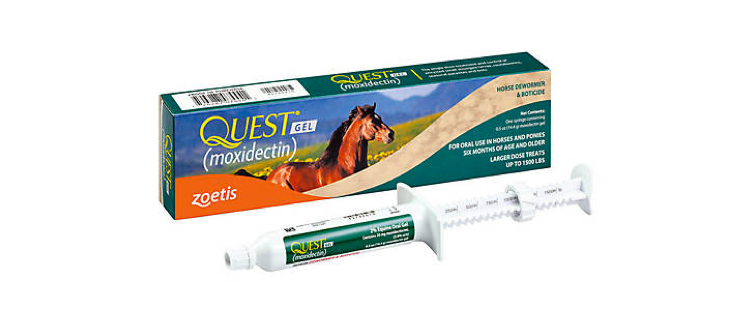
Multiple Parasites
OTC
(moxidectin)
Recommended for early grazing season. Quest Gel and Quest Plus Gel are the only dewormers that treat encysted small strongyles and bots in a single dose, with broad-spectrum support that also treats large strongyles (bloodworms), pinworms, hairworms and stomach worms. Easy gel formula dissolves on the tongue.
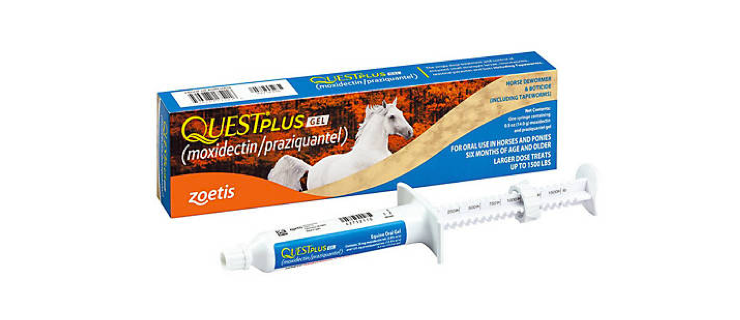
Multiple Parasites
OTC
(moxidectin/praziquantel)
Recommended for the end of grazing season. The only dewormer that treats encysted small strongyles, bots and tapeworms in a single dose, with broad-spectrum support that also treats large strongyles (bloodworms), pinworms, hairworms, and stomach worms. Easy gel formula dissolves on the tongue.
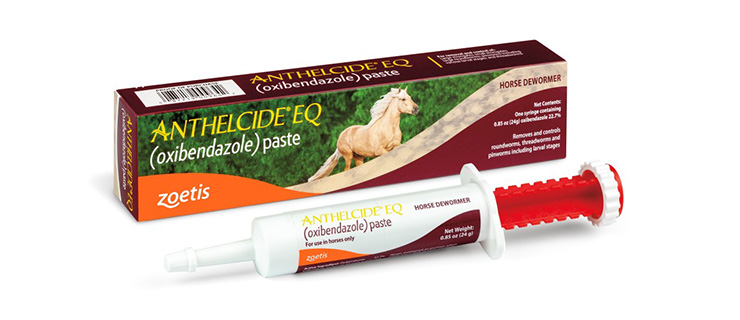
Roundworms in Foals
OTC
(oxibendazole)
Recommended for the essential treatment of roundworms (ascarids) in young foals at 2 to 3 months of age. Also effective against large strongyles (bloodworms) and pinworms in adult horses.
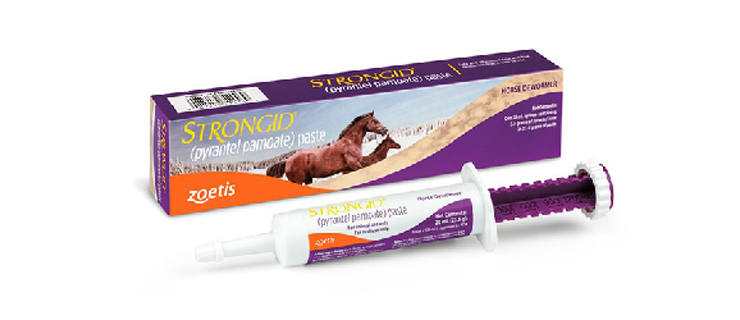
Roundworms in Foals
OTC
(pyrantel pamoate)
Recommended for the important treatment of roundworms (ascarids) in foals at 4 to 6 months of age and 1 month post-weaning. Also effective against large strongyles (bloodworms) and pinworms in adult horses.
Watch as Kenton Morgan, DVM explains the current approach to controlling today's most threatening parasites.
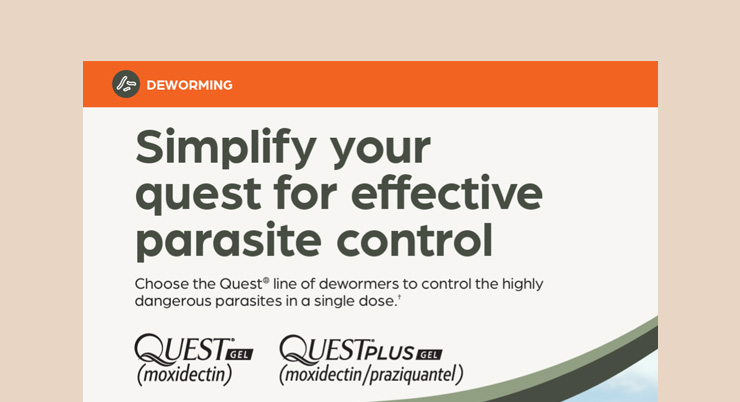
A comprehensive overview of the available treatment options from Zoetis that are used to target the right parasites at the right times.
View Document

Our adult horse guide includes recommendations for broodmares along with low and high shedders.
View Document

Foals require special care in their first year of life. View our customized dewroming schedule to help plan for timely treatments.
View Document

Young horses are more susceptible to parasites. See our comprehensive guide to deworming 1-to 2 -year-old horses.
View Document
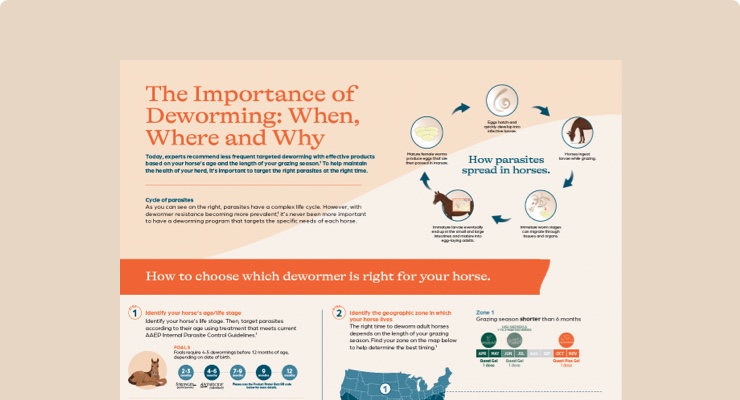
Hang this poster in your practice or share with clients to educate them on the importance of deworming, including when, where and why.
View Document
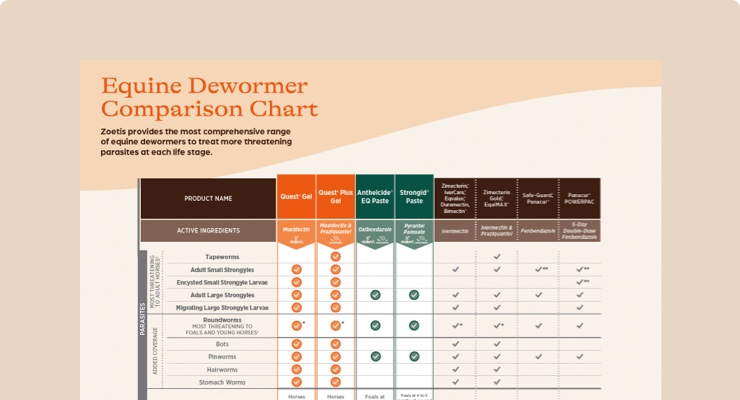
Refer to or print this poster to better understand the importance of deworming, including when, where, and why you should do it.
View Document
Horses are primarily exposed to worms or internal parasites by grazing on contaminated pastures. Horses shed parasite eggs in their stool. Depending on the parasite, these eggs infect other horses as they graze and ingest the eggs. Some eggs will “hatch” into an infective larval form, which is also ingested by grazing horses, continuing the process of parasite infection.
Some parasites—especially ascarids or roundworms in young horses—pose an infection risk in any environment due to their high numbers, their resilience and the inquisitive licking and nibbling behaviors of foals.
In many adult horses there may be no overt external signs of parasites, which is why performing regular fecal egg counts on your horses is so important.
The “classic” clinical signs that horses have worms are a potbelly, a rough haircoat and generally being unthrifty. These signs are especially evident in foals the first 2-7 months of age with heavy roundworm infections.
Short answer: yes, all horses have worms. But there can be significant variation in the number of parasite eggs that an individual horse sheds into the environment. That’s one important reason for performing fecal egg counts on horses. Based on the results, your veterinarian can then tailor a specific parasite control program for that horse or group of horses.
The important thing to remember is that not all horses need to or should be treated the same for parasites. Most adult horses need a basic parasite control program, while others may need a more intensive program depending on fecal egg counts and other risk factors as determined by your veterinarian. Foals require a different parasite control program because of their age and the specific parasites that, for the most part, aren’t found in healthy adult horses.
Your veterinarian is the best person to help design parasite control programs for all your horses, regardless of age.
The parasites that pose the greatest health risks to your adult horses are small strongyles (and their encysted stages) and tapeworms. In foals, the primary parasite of concern is roundworms (or ascarids).
Other parasites can also be living in your horse, but they don’t pose a significant health risk and are generally controlled with the same products that are used for small strongyles and roundworms. A good parasite control program will address all your horses’ needs.
You may find out what kind of worms your horses have by asking your veterinarian to perform a fecal egg count. This has a twofold benefit: first, it measures how many eggs your horse is shedding into the environment; second, it identifies the types of parasites your horse has.
There’s one important parasite exception to this testing, and that’s tapeworms. Tapeworm eggs are not consistently found in fecal egg counts. However, studies show that most horses are exposed to tapeworms.1 For this reason, it’s recommended that all adult horses be dewormed at least once per year for tapeworms. Deworming for tapeworms is done at the end of the grazing season, which typically translates into late fall or early winter.
Only certain deworming products are effective against tapeworms, so it’s important that you discuss them with your veterinarian.
It depends. There isn’t one deworming product that’s best for all horses in all circumstances. Considerations include the horse’s age and geographic region. Other risk factors can also determine which deworming product is best for your horse. Another important issue is the presence of parasite resistance to certain deworming ingredients.
But in general, for adult horses, most deworming products contain either moxidectin or ivermectin. Another ingredient (added to the moxidectin or ivermectin) called praziquantel specifically targets tapeworm parasites. Currently, the American Association of Equine Practitioners’ Internal Parasite Control Guidelines indicate that moxidectin is the treatment of choice for adult and encysted stages of small strongyles.1
In foals, where there’s most concern about roundworms, pyrantel or benzimidazole dewormers are the products of choice.
It’s important to consult with your veterinarian about which products are best for your horse or equine operation.
Again, this depends on several factors, including fecal egg count results, age, stocking density, manure management, feeding practices and whether horses are on pastures or kept in stalls.
In general, for adult horses that are shedding low levels of parasite eggs into the environment, one to two treatments per year should be adequate. Treatments should be administered at the beginning and end of the grazing season. The end-of-grazing-season treatment should contain ingredients which are effective against the encysted stages of small strongyles, tapeworms and bots. Adult horses that shed higher levels of eggs into the environment may require one or two additional treatments during the year.
Foals need more frequent deworming during the first year of life because their parasite risks are different than in adult horses. For these youngsters, deworming is recommended four times in their first year. The first two or three treatments target roundworms, while the third or fourth treatments address small strongyles as well as tapeworms as foals age and their parasite risks change.
To understand when and where to use deworming products, it’s important to consult with your veterinarian and work together to set up an effective program for the horses under your care.
Consult your veterinarian for assistance in the diagnosis, treatment, and control of parasitism.
Quest Gel & Quest Plus Gel
Do not use Quest Gel or Quest Plus Gel in foals less than 6 months of age or in sick, debilitated and underweight horses. Do not use in other animal species, as severe adverse reactions, including fatalities in dogs, may result.
References